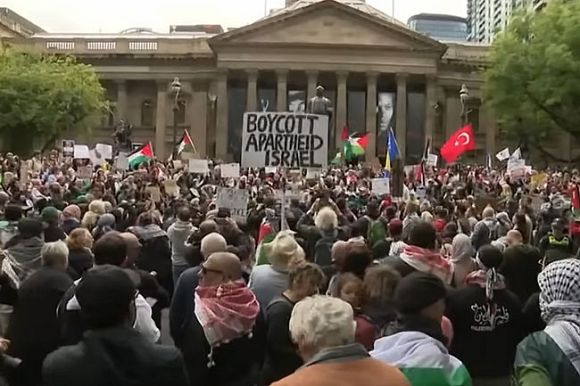Tabloid interviewer Piers Morgan has reduced the complexities of the Hamas/Israel conflict to a made-for-TV moral drama, seeking ratings and celebrity status. Dr Richard Hil reports.
SINCE THE TERRIBLE events of 7 October, journalist, broadcaster and serial contrarian Piers Morgan has taken to interviewing a coterie of Israeli and “pro-Palestinian” guests about the Middle Eastern conflict. Piers Morgan Uncensored, a high-octane TV chat-fest dedicated, apparently, to objective, hard-hitting journalism airs weekly on various Murdoch-owned television stations like Fox Nation and Sky News Australia, with repeats found on YouTube.
Morgan’s latest foray into the geo-political scene is designed, so we’re told, to foster “free speech” through the airing of competing viewpoints. To be sure, the horrors in Israel, Gaza and the West Bank have provided fertile ground for heated live TV exchanges.
Morgan’s guests include, among others:
- social media commentator Hasan Abi;
- Palestinian ambassador to the UK, Husam Zoloft;
- TV host and satirist Bassem Youssef;
- Palestinian influencer, Mohammed Hijab;
- conservative TV commentator Ben Shapiro; and
- former Israeli PM Ehud Barak.
If you want to get a sense of how differently Morgan treats his guests, compare how he talks to Ben Shapiro and Bassem Youssef. The former is given every opportunity to air his views, while the latter is subjected to a constant grilling. This may be an unconscious bias or a reflection of Piers’ general inconsistency when it comes to engaging with his guests.
Either way, Morgan's guests are not treated the same. Interestingly, this observation has been applied to the anchor of ABC’s 7.30, Sarah Ferguson, who has been accused of approaching her interviews with Israeli and Palestinian commentators very differently. This appears to be a pattern emerging across the mainstream media landscape.
Despite some obvious variation, Morgan’s guests invariably face rapid-fire, emotionally charged questions that offer little or no breathing space. It makes for attention-grabbing TV. Ultimately, it’s all about the show. The ratings. The infotainment.
Morgan’s inquisitorial style can hardly be described as interviewing, at least not in the way we usually think about this term. He likes to describe his jousts as “debates” or “conversations”. This is a stretch. In reality, they’re more akin to verbal kickboxing than rational discourse. Morgan courts controversy. He delights in firing things up, expressing faux outrage when guests have the temerity to take a contrary position to his own. Interestingly, Morgan’s “Uncensored” TV encounters are advertised as ‘Piers Morgan vs...’. Make of that what you will.
While often claiming to have achieved some “common ground” with his guests, the tone of Morgan’s broadcasts is remorselessly combative and adversarial. Common ground is the last place you’ll find Morgan and his guests. The latter usually can’t wait to get off air.
During several recent interviews dealing with the horrific bombing of the Al Ahli Arab hospital in Gaza, Morgan has taken a number of his guests to task for questioning the BBC “evidence” purporting to show that the rocket that killed hundreds of people was a stray Hamas missile rather than one fired by the Israeli military. This is all a little confusing.
Following the prompting of a senior Israeli Defence Force officer to view Al Jazeera footage that supposedly proved the rocket was fired by Hamas, the TV network did its own research which confirmed that all of Hamas’ rockets at that time were shot down by Iron Dome defence missiles. But Morgan would have none of it, repeatedly insisting on the veracity of the BBC findings.
What Morgan seems reluctant to grasp are the years of accumulated evidence showing that when Israel carries out some sort of intended or unintended atrocity, there is a predictable response of vitriolic denial, followed by a period of no comment, followed sometime later by a belated, half-hearted admission. Sometimes there is just silence. The intention, of course, is to gloss things over. The only problem is that people, especially the victims, do not forget. Nor do those bearing witness.
What I find extraordinary about Morgan’s close encounters, especially with his “pro-Palestinian” guests, is how they refuse to buckle under his Gatling gun tactics. Such is the nature of these exchanges that guests are stunned when they actually get an opportunity to respond fully before Morgan, with fixed eyes and ruddy complexion, re-enters the fray.
On occasion, however – and you have you hand it to Morgan – he’ll just ask a question and listen, as when the host of the online news show The Young Turks and U.S. Presidential candidate, Cenk Uygur, was allowed to air his views, largely without hindrance, and with a level of voluble passion that appeared to silence Morgan.
Much the same happened when Morgan interviewed Izzeldin Abuelaish, a Palestinian doctor whose children had been killed in a previous conflict and who has lost many relatives in the current bloodbath. The other instance of Morgan silence was evidenced when the program got what it wanted: a full-throated “fiery clash” between an Israeli rabbi and a staunch supporter of Palestinian statehood.
This is a rare occurrence, indeed. Morgan seems most perplexed when his journalistic reputation is challenged. He lauds his alleged accomplishments and brave moral positions, especially in relation to his opposition to the Iraq war. Remember, this is the former journalist of the scurrilous English tabloid, The Sun, that built its brand on low-brow gossip and trashing peoples’ reputations.
Morgan was later appointed as editor of the notorious and now defunct News of the World, and editor of The Daily Mirror which indulged in phone hacking under Morgan’s watch. The Leveson Inquiry found Morgan’s see-no-evil, hear-no-evil claims “utterly unpersuasive”. As far as his TV career is concerned, Morgan has a somewhat chequered record, having been dropped by CNN because of low ratings and infamously storming out of a Good Morning Britain studio.
During his stint with the latter program, Morgan conducted one of the worst examples of on-screen bullying when he repeatedly shouted at, overtalked and generally verballed his Extinction Rebellion guest.
This puts Morgan’s frequently aired claims that he is a man of high moral virtue under a cloud. During his recent TV performances, Morgan has boasted of how he often mentions the plight of the Palestinians, even though he finds it difficult to openly condemn the war crimes that are now being visited upon Gaza. This is odd given that these violations are being played out before our eyes. As I write, over 10,000 Gazans have been killed, at least a third or more of them children. There is no mention of how many Hamas militants have been killed.
The starvation being imposed on an already traumatised population seems secondary to Morgan’s unrelenting insistence that his guests condemn Hamas for its barbaric crimes. Even when they do, repeatedly, Morgan returns to his demand, as if his guests are incapable of admitting what is obvious.
I find the Piers Morgan interviews both riveting and appalling. It’s made-for-television pseudo-intellectualism that regularly ends up in a miasma of decontextualised contradiction and moral cul-de-sacs. To Morgan’s credit, he hasn’t gone as far as Fox News’s Bill O’Reilly who once screamed down and cut off his young antiwar guest, Jeremy M Glick.
No, Morgan is fixed on presenting himself as a man of reason, discharging his morally-infused journalistic duties. Unfortunately for him, his guests have often proved up to the task of exposing his claimed impartiality by homing in on his blind spots, selectivity and silences. Truth be told, Morgan’s shows, just like his former newspapers, are in the business of infotainment. His “journalism” is fashioned as much by TV ratings and celebrity status as it is by any pursuit of the “truth”.
It’s interesting that when Morgan interviewed Noam Chomsky in June of this year, the interrogative style suddenly disappeared. Instead, we got the sycophantic acknowledgment of a person who has dedicated his life to exposing the nonsense so often presented as news. For once, Morgan demonstrated the respect he has more than occasionally denied to others.
I have little doubt that Morgan is seeking to do his journalistic job as he sees it. The problem is that the culture of ratings-driven TV and the pursuit of “controversy” gets in the way. When it comes to the current Hamas/Palestine conflict, the high emotions that understandably permeate discussions on this issue seem like convenient fodder for TV kickboxing rather than sound journalism.
What’s missing in these shows, as often happens across the media, is a detailed and carefully constructed understanding of the background and context of the oppression of the Palestinian people since their ethnic cleansing in 1948. It is in this sense that programs like Piers Morgan Uncensored knowingly or otherwise spin the dominant narrative of the Israeli state.
Dr Richard Hil is adjunct professor in the School of Health Sciences and Social Work at Griffith University, Gold Coast; adjunct professor in the Faculty of Law, Business and Arts at Southern Cross University.
 This work is licensed under a Creative Commons Attribution-NonCommercial-NoDerivs 3.0 Australia License
This work is licensed under a Creative Commons Attribution-NonCommercial-NoDerivs 3.0 Australia License
Support independent journalism Subscribe to IA.












